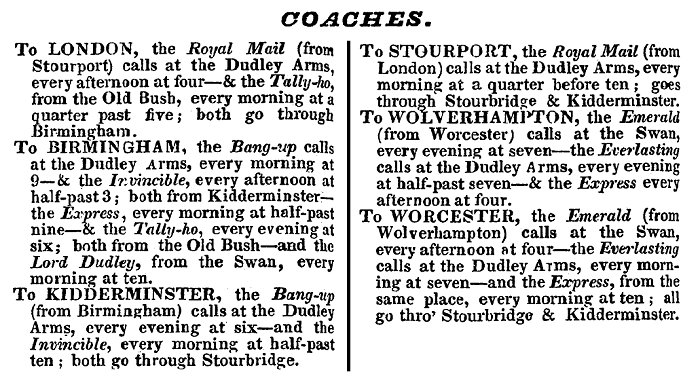|
Coach Travel
For many years the only form of
long distance travel from town to town, for most people,
was by the stage and the mail coaches that travelled
between coaching inns. Each town on a coach route had at
least one coaching inn where horses could be changed and
stabled, and refreshments were available, possibly along
with overnight accommodation.
In Dudley there was the Dudley
Arms, the Old Bush and the Swan. The routes each had a
name, which was well known to passengers. There was the
Tally-ho and the Royal Mail, both going to London via
Birmingham. The Bang-up, the Invincible, the Express and
the Lord Dudley travelled to Birmingham. The Emerald,
the Everlasting and the Express travelled to Worcester
via Stourbridge and Kidderminster. |
| The Post Office began running experimental mail
coaches in 1784. They were much lighter in weight,
and carried fewer outside passengers. The horses
were changed more frequently, journeys were faster,
and time keeping was much improved. The Royal Mail
coach travelled to London via Birmingham, from
Stourport, Kidderminster and Stourbridge every day
and stopped at the Dudley Arms Hotel at 4pm every
afternoon. It called on the way back at 9.45am in
the morning and picked-up the local mail from the
post office in Wolverhampton Street. |
|

From Pigot & Company's 1828
directory. |
|
This was the age of the highwaymen,
so most coaches carried at least one guard for
protection. There was a carrier service that carried
goods, but also took passengers. It was a cheaper way to
travel, but passengers had a rough and uncomfortable
open ride. A carrier service, run by Thomas Castle,
travelled from King Street to Birmingham on Mondays,
Tuesdays, Thursdays and Saturdays. Another service
operated by Thomas Wastell, ran from Priory Street, to Wolverhampton on Tuesdays, Walsall on
Wednesdays and Stourbridge on Fridays.
When railways appeared, the coaches quickly lost most of
their business. By 1851 they had all gone. |
 |
Return to the
previous page |
|